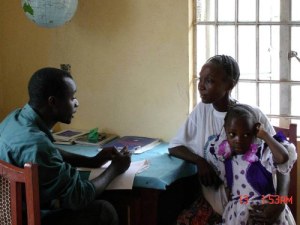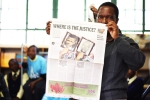Radio Days Africa: why radio is still key in communications for rights and governance in Africa
July 8, 2015 Leave a comment
Lazaro Bamo stood up in front of an attentive crowd at Radio Days Africa last Thursday to talk about his newly funded project, Face2Face.
He told the group that two months ago he pitched his project idea several times to a room full of people, all competing for funding during an intensive Global Innovation Competition week in Jakarta. On the last day of the competition, Bamo sweated through the final pitch in front of cameras (and a couple of hundred people) at a formal function up on stage until finally, along with four other projects, Face2Face won gold, meaning the project was considered innovative enough to be funded byMaking All Voices Count.
So, he said, speaking at Radio Days Africa would be much easier than that. The crowd laughed – we’re all communicators, but we’ve all been nervous presenters too.
Radio Days Africa
Bamo was part of a panel at Radio Days Africa that showed the strength of African innovation and the demand for community radio.
Radio Days Africa is the largest meeting of radio innovators and talent on the continent. It is based at the University of the Witwatersrand and is run by Wits Radio Academy’s Franz Kruger. The conference this year saw a larger focus on Africa than previous years (this was the 6th year of the conference) and it gathered speakers from across the continent, including Zambia, Nigeria and Mozambique, to talk about the importance of radio.
Who says radio isn’t innovative?
Only people who aren’t listening and learning. In 2015 there were five gold winners at the Global Innovation Competition, and two of these winners were involved with community radio – which says a lot about the critical role radio plays in Africa, not just in rural areas, but as an established voice in the lives and homes of most people in the continent.
Nooshin Erfani-Ghadimi, Project Coordinator of Wits Justice Project, introduced the panel and said that these two projects winning in Jakarta showed how important the medium was on the continent, despite the rise of the internet and social media. Both winning projects were on the panel.
- Face2Face: The first was Bamo’s Face2Face initiative which aims to track the experiences of people using Mozambique’s new Right to Information Law to obtain public information. Documenting their experiences and partnering with community radio, the project will highlight and challenge the barriers that still remain in getting information that is now legally supposed to be in the public domain.
- The Citizen Justice Network: The second project was The Citizen Justice Network. Paul McNally created the Citizen Justice Network (CJN) with Wits Justice Project and Wits Radio Academy and discussed how the concept went from a discussion, to a proposal, through the Making All Voices Count mentoring programme, to being implemented. The CJN will train junior paralegals at community advice offices to be journalists and help them produce radio stories on legal issues for their local community radio station. In this way, the CJN will operate as a bridge between those with the information around justice in a community and those who desperately need it, allowing Wits Justice Project in Johannesburg to identify patterns of miscarriages of justice across the country and implement this information in their ongoing advocacy. It will also – of great interest to the folk at Radio Days – promote quality and unbiased radio documentary and give producers the chance to distribute their content across the country and on-line.
So what’s next?
Bamo and McNally fielded questions from the audience and gave their thanks. They are both about to start their pilot projects with hope to scale them up, grow the funding and give a voice to the people in their respective areas. The two promise to meet in Mozambique next time (Bamo’s home turf) and collaborate further, but know they are supported by a vibrant and still-growing radio community who are challenging assumptions about governance and rights all across Africa.













